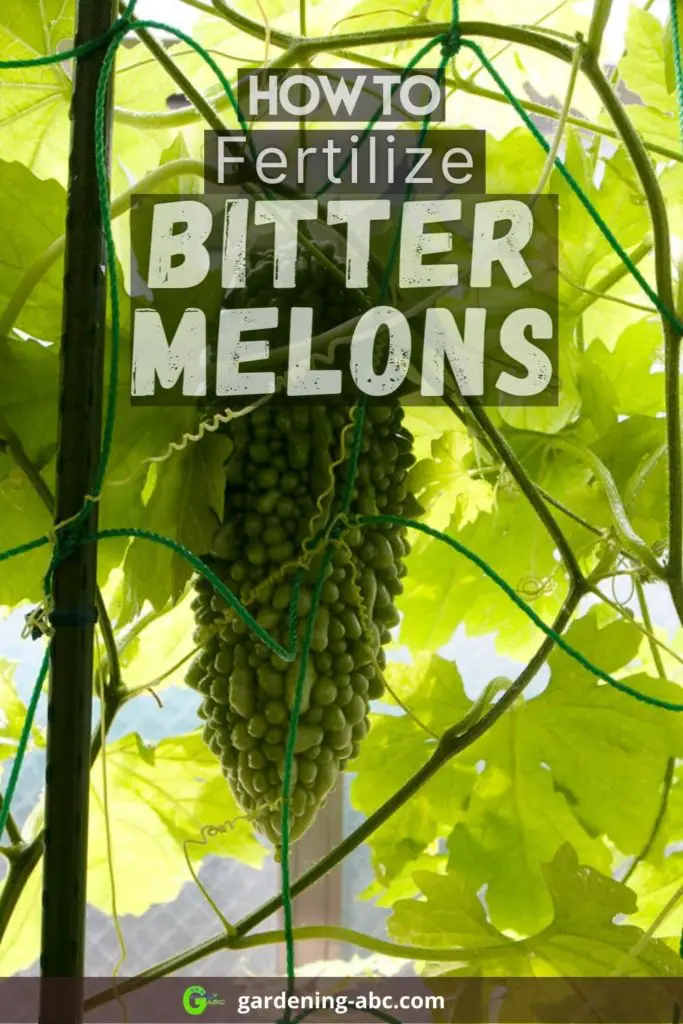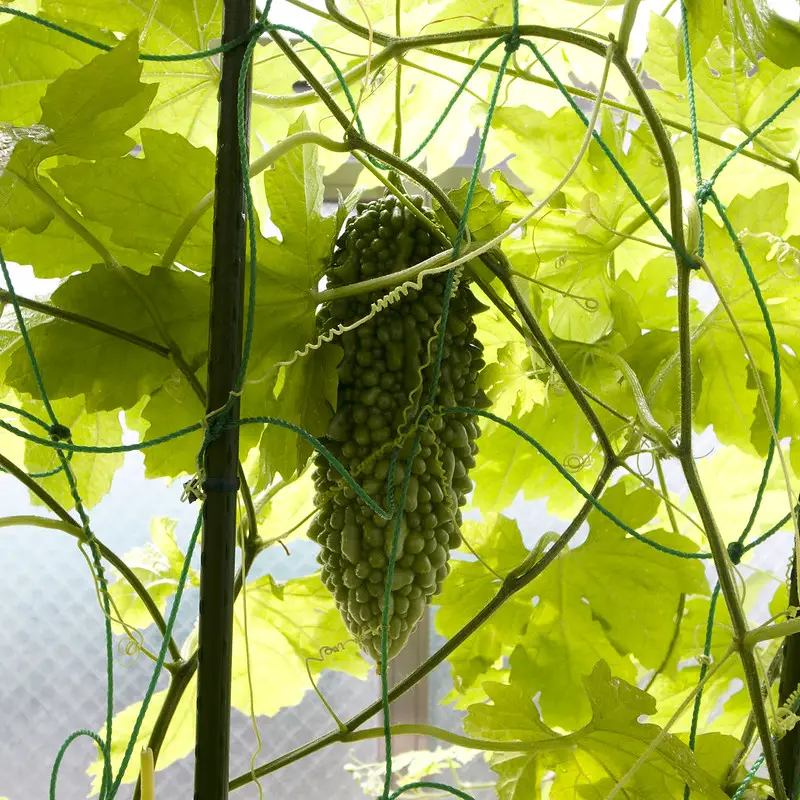We use affiliate links to run our site. When you buy through links on our site, we may earn an affiliate commission, without any added cost to you. Learn more
Fertilizing bitter melons is essential, otherwise, they will grow vertically without producing much fruit. Using the right fertilizers will help your melons grow faster and tastier. In this post, we are going to discuss what are the best fertilizers for bitter melons and how to use those fertilizers.
Bitter melons grow pretty fast and produce fruits and you have to feed your plants regularly to keep up with them. A very limited amount of plant nutrients are present in a pot. and none at all in a potting mix made solely of peat moss, composted bark, coco coir, and perlite.
These potting mix ingredients are not sources of food for plants – they simply give support to the roots and hold water and food for the roots to absorb. So it becomes your duty to give food to your plants.
Bitter melons need nitrogen, phosphorous, and potassium in good quantities. So the best fertilizer for bitter melons should have these three elements (N-P-K) in ample quantity. Some of the best fertilizers for bitter melon include Manure(FYM), quality compost, Blood meal, Bone meals, Fish emulsion, etc.
Why Bitter Melons Need Nitrogen (N):
All living cells use nitrogen, and all plants need plenty of nitrogen. Nitrogen is essential for forming proteins, enzymes, chlorophyll, and in almost all of their metabolic processes.
Too much nitrogen can result in lush green foliage but little or no fruit. But too little nitrogen can bring plant growth to a halt. So you have to provide enough for optimum growth without overdoing it. For bitter melons, this means a middle-ranged amount of nitrogen.
Why Bitter Melons Need Phosphorous (P):
Phosphorous is very important for the growth of the roots in the early stages of the plant. Phosphorus is also essential in flowering and forming seeds in bitter melons. Lack of phosphorus can lead to dark pigmented leaves and can slow down the fruiting process in bitter melons.
Why Bitter Melons Need Potassium (K):
Potassium helps a bitter melon plant in almost every part of plant growth and metabolism. It assists in photosynthesis, draws water into every plant cell, keeps each cell plump, hydrated, and healthy, supports every type of transport, moving food, nutrients, and chemicals all through every part of the plant.
Look For trace elements:
Whenever you buy any fertilizer, keep an eye on the trace elements in the formula. Trace elements are very important for any plant’s survival. Though these nutrients are only needed in very small quantities they are crucial for a plant.
If you are using homemade compost to fertilize your bitter melons, try to add many different compost ingredients so the plant can get many trace elements and not only NPK.
Get Your Soil Tested:
The best way to determine what kind of fertilizer you should use is to get your soil tested. This will tell you the levels of nutrients in your soil, and where there might be deficiencies.
You can then use the information to choose a fertilizer with the proper nutrient ratio.
The Value of Organic Fertilizers
Organic fertilizer is one of the most important components that could work as the backbone of any farming.
They are derived from natural sources, such as plants and animals. They are usually healthier and more environmentally friendly than chemical fertilizers, which can harm the environment if not used correctly.
Best Fertilizers For Bitter Melons
Here are some of the best fertilizers for bitter melons. Apply them to your soil to get the best possible results.
Manures:
This is a natural fertilizer that is made from animal waste and decomposing matter. It contains nutrients that promote plant growth and is a good source of nitrogen, phosphorus, potassium, and other essential minerals to help plants grow stronger and healthier.
Animal manure is an excellent organic fertilizer for bitter melons because it helps them grow better in soil that has a low PH value.
The amount of manure that you have to add, varies on the current fertility of the soil, variety of the bitter melon, climate, season, etc. Generally, you should add 10 kg of FYM (farmyard manure) per pit.
For a larger garden, mix 15-20 t/ha FYM during plowing.
What is FYM?
FYM or farmyard manure is the decomposed mix of dung, urine, and leftover fodder. It is a very good source of NPK. A well-decomposed FYM usually contains 0.5 percent N, 0.2 percent P2O5and .0.5 percent K2O.
All the nutrients present in farmyard manure are not available immediately. About 30 percent of nitrogen, 60 to 70 percent of phosphorus, and 70 percent of potassium are available to your first set of bitter melons.
Other than bitter melons plants such as potatoes, carrots, onion radish, etc does particularly well in farmyard manure or FYM.
Compost:
Bitter melons prefer rich soil with lots of organic matter. Adding compost will do wonders for your soil structure and its ability to retain nutrients and water.
You can also add compost tea for added nutrients and beneficial microbes that will help break down organic matter faster.
Blood Meal:
A blood meal is rich in nitrogen. and it will provide the needed nitrogen to your bitter melons. Feed your bitter melons with blood meal during the growing season. It can be used as a general fertilizer for enriching the soil.
Blood meal promotes healthy root development and helps prevent blossom-end rot (a disorder that affects tomato crops).
Blood meals are easy to get, you can visit your nursery store nearby or buy them online.
Bone Meal:
This will provide your plant with phosphorus and calcium. These are necessary nutrients for plant growth and development. You can easily buy bone meals from Amazon.
Fish Emulsion:
This is rich in nitrogen and other micro-nutrients that are needed by plants to grow well. It’s very effective as a foliar spray or as a side dressing spray that you can do on top of your soil.
The fish emulsion contains fish byproducts, seaweed extract, kelp extract, and amino acids which boost the health of your plants.
Apply fish emulsion every two weeks to give bitter melons the needed nutrient boost.
Fertilizing Bitter Melons:
It’s important to apply fertilizers at the right times — too early or too late and you can do more harm than good. Always check the packaging to make sure you’re applying at the right time for your area and climate zone.
Conclusion:
As you can see bitter melon fertilizers are not hard to find. With a little bit of knowledge of what the plants need and how to fertilize bitter melons, you can get the best-tasting fruits in your own backyard.
we hope this post has been informational for you. For more information like planting, care, and harvesting bitter melons check out our earlier post.
Like the post? Don’t Forget To PIN IT

Amazon and the Amazon logo are trademarks of Amazon.com, Inc, or its affiliates.

Hi there! My name is Prasenjit and I’m an avid gardener and someone who has grown a passion for growing plants. From my hands-on experience, I have learned what works and what doesn’t. Here I share everything I have learned.
